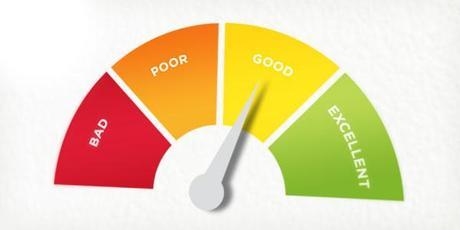
Whenever you apply to borrow money – whether it be a loan, a credit card or a mortgage – the lending company will use your credit score to decide whether or not they want to give you the money.
It can be incredibly frustrating being declined credit, especially when you have no idea why you were turned down. Many people are oblivious to the world of credit scoring and have never looked at their credit report. We have put together this guide to help you understand what credit scoring is and how to improve your chances of being accepted by a lender.
What is a credit score?

Every lender has their own idea of a ‘perfect customer’. When you apply to borrow money from them, they will assess you and your circumstances and give you a score to see how you stack up against this ideal.
Contrary to popular belief, there is no such thing as a universal credit score. Every lender looks for different things and has a slightly different scoring system. So strictly speaking, you do not have a credit score – however you can get a credit report (more on that further down).
Because there is no such thing as a universal credit score, there is also no such thing as a credit ‘black list’ – so just because one lender says no, it doesn’t necessarily mean the next one will.
Is there such a thing as an average credit score?
People often ask ‘what should my credit rating be?’ or ‘what is a good credit score?’ There’s no straightforward answer because every bank and lender will score you differently, based on their own criteria. What is attractive to one lender may not be attractive to another. A better question to ask is ‘what can I do to improve my credit score?’
What is a credit report?

Your credit report (also known as a credit file) contains information about your past financial behaviour – who you’ve borrowed money from, how much, whether you paid it back on time, and what you still owe.
Credit reports are held by three different companies in the UK: Experian, Equifax and Callcredit. These are known as credit reference agencies.
When you apply for a loan, credit card or mortgage, the lender will use your credit report (provided by one of the credit reference agencies) to compile your credit score.
What information is in your credit report?
You credit report contains publicly available information plus information provided by lenders. This includes:
General information about you:
- Your name, address and date-of-birth
- Any previous addresses
- Whether or not you are on the electoral register
- Any County Court Judgements (CCJs) you’ve had
- Whether you’ve been declared bankrupt or had an IVA
- Whether you’ve had a house repossessed, or you’ve moved house whilst owing money
Financial activity:
- Information about your bank accounts and overdrafts
- A list of credit accounts – how much you have borrowed, your credit limits, when you opened the accounts and so on
- Details of any late or missed payments
- Other people you are financially linked to e.g. with a joint bank account or mortgage
- Some credit reports also contain data from utility and phone providers
Other information:
- A record is made whenever you apply for credit – or more specifically, whenever a lender searches your credit report
The data on your credit report goes back 6 years.
When you apply for credit, a lender will look at the information on your credit report along with the information you provide on your application. This could include things like your salary, your monthly outgoings, whether or not you are a homeowner, and your reason for wanting a loan.
What isn’t in your credit report
Your credit report does not contain any of the following information:
- Your race, religion or colour
- Your medical history
- Criminal records (including driving and parking fines)
- Information about your family or who you live with (it will include joint financial products, as mentioned above)
- Your salary (although your lender will almost definitely ask for this on the application)
- Your savings – but be aware that if you are applying with the same bank your savings are held with, they will have access to this information
- How often you have checked your credit report (it only shows up when a lender has looked at your report)
- PPI claims (more about that here)
- Any financial information that is over 6 years old
How can I see my credit report?

You can check your credit report via one the three credit reference agencies we mentioned earlier. You normally have to pay – although Experian are offering a 30-day free trial, which you are able to cancel if you are not happy – see our Experian credit report page for all the details.
How to improve your credit score
Lenders use your credit report combined with any other information they have about you to try and predict your future behaviour. They will look out for positive signs as well things that will set-off alarm bells. Luckily, there are a few things that you can do to improve your prospects.
1. Check that everything is correct
Once you have got your hands on your credit report, the first thing you should do is check it thoroughly. Incorrect or inaccurate information could harm your chances of being accepted by a lender. If you do spot a mistake, contact Experian (or the agency you are using) and ask them to update the necessary information.
2. Register on the electoral role
This provides evidence that you live at your current address. It’s difficult to get any kind of credit if you haven’t done this yet. Find out how to register here.
3. Remember that lenders like stability
Showing signs of stability makes you appear as less of a risk – so lenders prefer homeowners to renters and people who are employed rather than self-employed. Frequently changing address or employer can put lenders off. Even simple things like having land-line phone number rather than a mobile can help improve your chances.
4. Keep up-to-date with repayments
Just one or two missed payments can cause you problems, so make sure you always pay on time.
5. Spread-out your applications
Too many applications in a short space of time can make you look desperate. Rejected applications don’t show up on your report, but if several lenders have performed a credit check in a short space of time it becomes obvious that you are being repeatedly rejected.
6. Ask lenders to perform a ‘soft search’ first
Also known as a ‘quotation search’. It is actually possible for lenders to perform a kind of credit check that won’t leave a mark on your credit report. They will rarely do this however unless you specifically ask for it, so make sure you do.
7. Cancel unused cards
If you have several credit cards that you don’t use, consider cancelling most of them. Even though you’re not using them, those cards give you access to a lot of credit, which in turn makes lenders nervous about giving you more. You may also want to consider closing unnecessary bank accounts that give you access to an overdraft.
8. If you don’t have a credit history
If you’ve never borrowed money in the past, it’s difficult for the lenders to predict your future behaviour. You need to build up a good reputation from scratch. One way to do this is to get a credit card, use it for small, sensible purchases and pay off the balance in full every month – without fail.
9. If you have a bad credit history
The same applies as above. Make sure you are up-to-date with your current commitments and start building up a good credit history. It will take time, but your credit score can recover if you start behaving yourself from now on. If you are struggling with debt, you may find our debt reduction page useful.
Have we missed anything out?
Do you know of any other things that can boost your credit score? Have you had any interesting experiences – good or bad – when it comes to applying for credit? Let us know about it in the comments section below.
Share this article:


